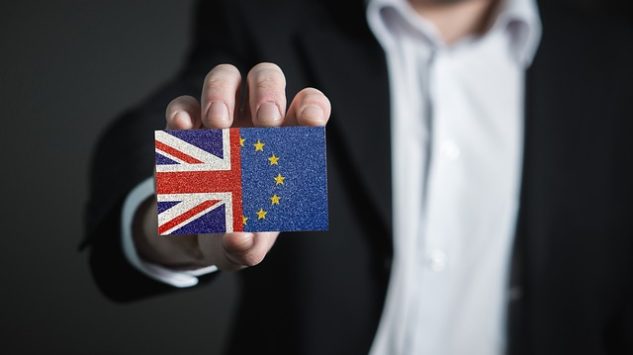Issue Briefs

Is Britain getting ready for Brexit?
August 20, 2019
By Graham Bardgett
Battle lines have been drawn at Westminster as the UK rapidly nears the 31 October exit from the EU after three years of national crisis that threatens the political union of Great Britain and Northern Ireland. With Scotland pledged to go it alone to remain in the EU while Northern Ireland, part of the UK, looks set to have a hard border again 20 years on from the Good Friday Peace Agreement – in this the 50th anniversary of the start of the Troubles. Despite all the efforts of the EU and the Irish Republic’s Government, there seems no likely way of preventing the 300-mile-long hard border being created because of border controls between the EU and the UK that would be needed after Brexit. And with the UK’s new Prime Minister Boris Johnson having won vast support from Brexiteers eager to leave the EU a No Deal transition on 31 October looks set to take place.
Does the Labour opposition have a better plan?
Labour Opposition Leader Jeremy Corbyn, amid a new row between his Party and the LibDems who also elected their own new leader, there have been calls for a Government of National Unity. The Tory party has “failed” the UK and a general election is the “change of direction the country needs”, Jeremy Corbyn has said. The Labour leader said the UK is facing a Brexit “crisis” and vowed to do “everything necessary” to stop the UK leaving the EU without a deal.
This comes after a leaked government report warned of food and medicine shortages in a no-deal exit. Conservative Party Cabinet minister Michael Gove said it outlined a “worst-case scenario”.
Speaking in Northamptonshire, Mr Corbyn said he supported recalling Parliament before MPs are due to return in September, so that Brexit could be discussed.
He said this would prevent Prime Minister Boris Johnson “having some kind of maneuver to take the UK out on October 31 without any further discussion in Parliament”. Parliament could be reconvened if the government put a request in to the House of Commons Speaker John Bercow.
Shadow chancellor John McDonnell said Mr Corbyn will meet other British political leaders to discuss tactics to prevent a no-deal Brexit. Mr Gove, who is responsible for no-deal preparations, said the leaked cross-government study, codenamed Operation Yellowhammer, was old and that Brexit planning had accelerated since Boris Johnson became prime minister.
The Boris Johnson plan
Indeed, since Boris Johnson was elected Prime Minister by his own Conservative Party members, 10 Downing Street has issued over 30 Press Releases concerning new policies, rounds of diplomacy with world leaders, and he has pledged to revitalise the failing National Health Service.
A Downing Street source said the no-deal impact study leaked to the Sunday Times was presented at the first daily no-deal preparation meeting under Mr Johnson’s government in July – but said it was prepared by the previous administration of Teresa May when she was Prime Minister.
A government source also said the no-deal study had been leaked by a disgruntled ex-minister in an attempt to influence new discussions with EU leaders.
But Lord Kerslake, a former head of the civil service, said the dossier “lays bare the scale of the risks we are facing”.
Early elections?
Mr Johnson – whose government has a parliamentary majority of only one vote – has ruled out holding a general election before the 31 October Brexit deadline.
But Mr Corbyn plans to win a vote of no-confidence in the government. This would begin a crucial 14-day period, after which a general election could automatically be triggered.
To stop that automatic election taking place, the existing government, or an alternative one formed during that period, must persuade MPs to pass a vote of confidence. Within the two prescribed weeks, Mr Corbyn wants to become a temporary PM, then delay Brexit and call a snap election. There are no firm rules about who, if anyone, should get the chance to form an alternative government during the 14-day period. Speaking after his speech, Mr Corbyn said the “constitutional precedent” was for the leader of the opposition to “take over” if a government collapses.
Political Maneuvers
However Liberal Democrat leader Jo Swinson has suggested Mr Corbyn would fail to get MPs’ support, and she would not support him becoming caretaker PM. Reacting to Mr Corbyn’s speech, the party’s Brexit spokesman Tom Brake said: “It is clear Jeremy Corbyn cannot command a majority in the House. “He must do the right thing and confirm that if he cannot, he will support someone who can,” he said. If Mr Johnson survives a vote of no-confidence, a general election appears unlikely before the UK leaves the EU.
Mr Corbyn said the Tories have “lurched to the hard right under Boris Johnson”, calling him “Britain’s Trump”. “A general election triggered by the Tory Brexit crisis will be a crossroads for our country. It will be a once-in-a-generation chance for a real change of direction, potentially on the scale of 1945,” he said. “And if there is a general election this autumn, Labour would commit to holding a public vote, to give voters the final say, with credible options for both sides, including the option to remain [in the EU].”
Brexit and the broader political fight
Conservative Party chairman James Cleverly said Mr Corbyn offers more “dither and delay”. “This is a cynical attempt to seize power by a man who would wreck the economy, is soft on crime and won’t stand up for Britain,” he said. “Only Boris Johnson and the Conservatives can provide the leadership Britain needs and deliver Brexit by 31 October, whatever happens.”
UK Government Brexit scenarios
Mr Johnson is travelling to France and Germany to meet EU leaders.
The prime minister will insist there must be a new Brexit deal when he holds talks with German Chancellor Angela Merkel and French President Emmanuel Macron.
- The leaked dossier said leaving the EU without a deal could lead to:
- Fresh food becoming less available and prices rising
- A hard Irish border after plans to avoid checks fail, sparking protests
- Fuel becoming less available and 2,000 jobs being lost if the government sets petrol import tariffs to 0%, potentially causing two oil refineries to close
- UK patients having to wait longer for medicines, including insulin and flu vaccines
- A rise in public disorder and community tensions resulting from a shortage of food and drugs
- Passengers being delayed at EU airports, Eurotunnel and Dover
- Freight disruption at ports lasting up to three months, caused by customs checks, before traffic flow improves to 50-70% of the current rate
The government says it is scaling up preparations for a no-deal Brexit on 31 October.
A week after taking office, Prime Minister Boris Johnson pledged an extra £2.1bn specifically to prepare for leaving the EU without a deal.
Prior to this, the government led by Theresa May had promised £4.2bn to prepare for a range of Brexit scenarios.
The extra £2.1bn will fund preparations including:
- 500 extra border force officers
- Infrastructure around ports
- Managing traffic disruption in Kent
- Freight capacity, warehousing and stockpiling of medicines
- Public communications to help people and businesses
Johnson’s plan
- Mr Johnson has also set up three new cabinet committees, which will meet more frequently than Mrs May’s EU Exit Committee did – including one which will meet daily,
- So, what has the government already done to prepare?
- At the end of June, the Department of Health and Social Care (DHSC) started a new process of “securing” freight capacity, warehouse space and fridges in order to stockpile medicines.
- Of the £2.1bn pledged for no deal preparations, £434 million has been set aside for this.
- Ahead of the UK’s original departure date of 29 March – then extended to 12 April – the DHSC said thousands of medicines had been analysed to work out what might be affected by supply disruption from the EU.
- Suppliers stockpiled an additional six weeks’ worth of these drugs over and above the usual “buffer” stock.
- Observers of the whole Brexit saga over the past three years struggle to even understand how Britain has become a battle zone of political opinion.
Still, in these final weeks up to the Halloween 31 October EU Brexit, it is still anyone’s guess as to exactly what will actually happen. But Prime Minister Boris Johnson is determined to see it through as promised. Fifty two per cent of the UK Electorate wanted to leave the EU, while 48 per cent voted Remain. Whether a Second Referendum would yield different results is a matter of opinion.
The views and opinions expressed in this issue brief are those of the author.
 |
Graham Bardgett is a Global Policy Institute Fellow. He has reported for the Los Angeles Post Examiner and Baltimore Post Examiner and is a former BBC Radio News sub-editor in London and Veteran reporter of the Northern Ireland Troubles and Peace Process. He had five years on the news desk of BBC Northern Ireland, nine years as a security reporter on the Belfast Telegraph, four years as Ireland staff reporter for the Daily Mail, and was a correspondent for the Financial Times, Daily Mirror, Sunday Express, and Irish Daily Mail. During his career he has also reported from Berlin, Luxembourg, and Rome, and carried out public affairs critical incident consultancy work in Kazakhstan and in London. He had four years with PwC international accountants and consultants; and was previously a UK Government Higher Executive Press Officer. |